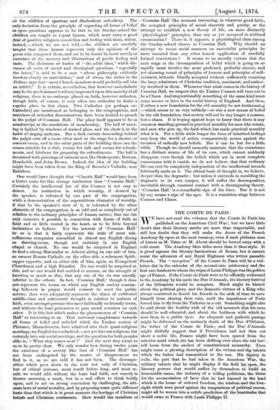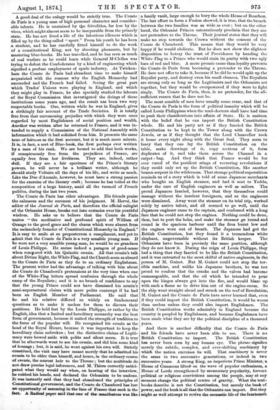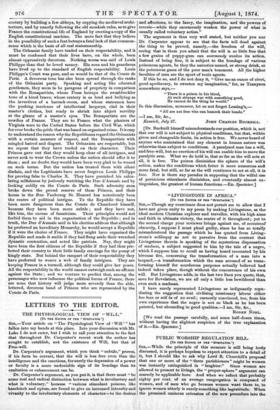THE coArrE DE PARIS.
WE have not read the volumes that the Comte de Paris has published on the American Civil War ; but we have little doubt that their literary merits are more than respectable, and still less doubt that they will make the doors of the French Academy fly open at the next vacancy, even if such plebeian men of letters as M. Taine or M. About should be bowed away with a cold sneer. The Academy likes titles more than it likes style. It is proof against the literary fascinations of Renan, but it cannot resist the advances of any Royal Highness who writes passable French. The " reception " of the Comte de Paris will be a red- letter day in the calendar of the second-rate aristocracy and the first-rate bankers to whom the reign of Louis Philippe was the golden age of France. If the Comte de Paris were to be officially welcomed to the Academy by his uncle the Due d'Aumale, the literary festival of the Orleanists would be complete. Much might be hinted about the political glory and the domestic virtues of a King who always contrived to desert his friends in the nick of time to save himself from sharing their ruin, until the impatience of Paris forced him to fly from the Tuileries in a cab. Something might also be said about the healthy wish of the old monarch that his sons should be well educated, and about the boldness with -which lie sent them to a public ire& An eloquent and pathetic passage might be delivered on the untimely death of the Duo d'Orleana, the father of the Comte de Paris ; and the Duo d'Aumale might skilfully suggest that if Providence had not thus cut short a noble life, France might have been spared from the miseries amid which she has been drifting ever since she cut het:, self loose from the anchor of constitutional monarchy. Then might come a glowing description of the virtues and thp talents which the father had transmitted to the son. His dignity in exile, the part that he had taken in the American War, the military talents that he might display if the field lay open, the literary powers that would suffice by themselves to build an honourable name, the industry of a toiling politician, the thirst for the accumulation of facts that he had learned in the land which is the home of ordered freedom, the wisdom and the fore- sight which were proof against the temptations of political excess, might all be woven into a subtle prediction of the beatitudes that would come to France with Louis Philippe II. A good deal of the eulogy would be strictly true. The Comte de Paris is a young man of high personal character and consider- able talents. He is unstained by tite frivolities, far leas by the vices, which might almost seem to be inseparable from the princely state. He has not lived a life of the laborious idleness which is filed up by the thing called "sport." From his youth he has been a student, and he has carefully fitted himself to do the work of a constitutional King, not by shooting pheasants, but by mastering blue-books. He has travelled, and he has seen as much of real warfare as he could learn while General M'Clellan was trying to defeat the Confederates by a kind of engineering which signified a profuse employment of spade industry. At Twicken- ham the Comte de Paris had abundant time to make himself acquainted with the reasons why the English Monarchy had succeeded and the French had failed. Seeing the great part which Trades' Unions were playing in England, and which they might play in France, he also specially studied the labours of the Royal Commission that investigated the doings of these institutions some years ago, and the result has been two very respectable books. One, written while he was in England, gives a strikingly fair account of the Trade Societies. It is totally free from that unreasoning prejudice with which they were once regarded by most Englishmen of social position and wealth. Another was written after he returned to France, and it was in- tended to supply a Commission of the National Assembly with information which it had solicited from him. It presents the same tone of fairness as the first account, but it is much more minute. It is, in fact, a sort of Blue-book, the first perhaps ever written by a man of his rank. We are bound to add that both works, if conspicuously free from the prejudices of France, are equally free from her liveliness. They are, indeed, rather -dull If they are a fair specimen of the Prince's literary powers, he will never be a brilliant writer, although he .should study Voltaire all the days of his lifer and write as much. Like the Duo d'Aumale, however, he must have a strong passion for the exercise of the literary craft ; because he has toiled at the composition of a large history, amid all the turmoil of French politics, during the last two years.
The Comte de Paris has other advantages. His friends praise the calmness and the sureness of his judgment. M. nerve, the .editor of the Journal de Paris, and therefore the official eulogist of the Orleanist House, breaks out into ecstacies over his youthful wisdom. He asks us to believe that the Comte de Paris unites "the meditative and profound spirit of William of 'Orange to the good Krace and the charm which were absent from the melancholy founder of Constitutional Monarchy in England." Itis easy to smile at so preposterous a compliment, and yet to admit that the Comte de Paris is a very sensible young man. If he were not a very sensible young man, he would be no grandson of Louis Philippe. He seems indeed a paragon of good-sense when compared with his Quixotic cousin. All that cousin's talk about Divine Right, the White Flag, and the Church seem as absurd to the Comte de Paris as they do to an ordinary Englishman. 'The present writer had the advantage of talking with him about the Comte de Chamborcl's pretensions at the very time when one of the White-Flag letters spread confusion through the whole camp of the Royalists ; and it is no breach of confidence to say that the young Prince could not have dismissed his cousin's semi-supernatural claims with more polite contempt if he had been an English Member of Parliament He said that he and his relative differed so widely on fundamental questions as to make it useless for them to discuss their positions. He held fast by the Louis Philippe, or rather by the English, idea that a limited and hereditary monarchy was the best form of government, because it united the strength of tradition to the force of the popular will. He recognised his cousin as the head of the Royal House, because it was important to keep the hereditary claim unbroken ; but the distinctive claims of Legiti- macy were bowed aside with polite and silent acorn. It is true that he afterwards went to see his cousin, and did him some kind of homage ; but, it is said, he went against his own will. Strictly construed, the visit may have meant merely that he admitted his cousin to be older than himself, and hence, in the ordinary course of events, the nearest heir to the Throne ; but the multitude do not draw precise legal inferences, and M. Thiers correctly antici- pated what they would say when, on hearing of the interview, he rubbed his hands, and declared the Orleanists to be undone. It was instantly said that they had abandoned the principles of Constitutional government, and the Comte de Chambord has lost no opportunity of assuming in the face of France that such is the last. A Radical paper said that one of the manifeatoes was like a family vault, large enough to bury the whole House of Bourbon. The last effort to form a Fusion showed, it is true, that the breach between the two families was as wide as ever ; but on the other hand, the Orleanist Princes ostentatiously proclaim that they are not pretenders to the Throne. Their journal states that they will make no step towards the Crown without the consent of the Comte de Chambord. This means that they would be very happy if he would abdicate. But he does not show the slightest disposition to betray the trust of Providence by handing the White Flag to a Prince who would stain its purity with two ugly bars of red and blue. A more prosaic cause than loyalty prevents the Comte de Paris from becoming a pretender to the Throne. He dare not offer to take it, because if he did he would split up the Royalist party, and destroy even his small chances. The Royalists are strong only so long as the Legitimists and the Orleanists act together, but they would be overpowered if they were to fight singly. The Comte de Paris, then, is no pretender, for the all- sufficient reason that he dare not be.
The most sensible of men have usually some craze, and that of the Comte de Paris is the form of political insanity which will be called Louis Philippi= when the mad-doctors shall have had time to push their classifications into affairs of State. He is smitten with the belief that he can import the British Constitution whole. He and his party act as if they fancied the British Constitution to be kept in the Tower along with the Crown Jewels, or as if they thought that the Lord Chancellor took it home every night along with the Great Seal They seem to fancy that they can lay the British Constitution on the table, make drawings of it, copy sections of it, form duplicates of it, and take them across the Channel in a carpet - bag. And they think that France would be for ever cured of the pestilent stings of recurring revolutions if they could only set up the British Constitution, like another brazen serpent in the wilderness. That strange political superstition reminds us of a story which is told of some Japanese merchants who bought an English steamer, and had it sent to Yeddo, under the care of English engineers as well as sailors. The
proud Japanese fancied, however, that they themselves could manage without the insolent foreigners, and so the engineers
were dismissed. Away went the steamer on its trial trip, worked solely by native talent, and all seemed to go well, until the Japanese engineer came to the captain, and confessed with a long face that he could not stop the engines. Nothing could be done, then, but to port the helm, and make the steamer go round and round in the spacious harbour until the fires burnt low and the engines were out of breath. The Japanese had got the British Constitution, but they found it a tremendous white
elephant, ungovernable without its British keeper. The Orleanists have been in precisely the same position, although they do not know it. During the reign of Louis Philippe, they had a thing that they fancied to be hire the British Constitution, and it was entrusted to the most skilful of native engineers, in the person of M. Guizot. But M. Guizot could not stop the ter- rible machine, and unlike his Japanese brothers, he was too proud to confess that the cranks and the valves had become unmanageable, and that the oil which he intended to pour upon the hinges always got into the fire, and would blaze up with such a flame as to drive him out of the engine-room. So the ship went straight ahead and struck on the reef of Revolution.
M. Guizot and the Comte de Paris have never learned that, even if they could import the British Constitution, it would be worse than useless unless they could also import Englishmen. The British Constitution works admirably in England because the country is peopled by Englishmen, and because Englishmen have been made what they are by the political discipline of a thousand years.
And there is another difficulty that the Comte de Paris and his friends have never been able to see. There is no
British Constitution to import. The British Constitution has never been seen by any human eye. The phrase signifies merely the subtile, complex, and ever-shifting machinery by which the nation exercises its will. That machinery is never the same in two successive generations, or indeed in two successive years. A strong King, an imperious Prime Minister, a House of Commons lifted on the wave of popular enthusiasm, a House of Lords strengthened by momentary popularity, fervent political or religious convictions among the people, may at any moment change the political centre of gravity. What the text- books describe is not the Constitution, but merely the husk of power, and the husk is all that the Orleanists can import. But they might as well attempt to revive the monastic life of the fourteenth century by building a few abbeys, by copying the medieval archi- tecture, and by exactly following the old monkish rules, as to give France the constitutional life of England by erecting a copy of the English constitutional machine. The mere fact that they believe in the possibility of such a feat betrays a fatal lack of that common- sense which is the basis of all real statesmanship.
The Orleanist family have traded on their respectability, and it must be confessed that their lives have, on the whole, been almost oppressively decorous. Nothing worse was said of Louis Philippe than that he loved money. His sons and his grandsons have lived up to the standard of English respectability. Louis Philippe's Court was pure, and so would be that of the Comte de Paris. A decorous tone has also been spread through the ranks of the Orleanist party. Speaking and acting like educated gentlemen, they seem to be paragons of propriety in comparison with the Bonapartists, whose Press betrays the swashbuckler tone of a hired bravo, whose oratory is as loud and bullying as the invectives of a barrack-room, and whose statesmen have the pushing insolence of intellectual lacqueys, clad in their master's clothes, but ready to shrink into abject servility at the glance of a master's eyes. The Bonapartists are the rowdies of France. They are to France what the planters of Virginia were to the United States before the Civil War, which for ever broke the pride that was based on organised crime. It is easy to understand the reason why the Republicans regard the Orleanists with a certain measure of respect, and the Bonapartists with mingled hatred and disgust. The Orleanists are respectable, but we repeat that they have traded on their character. Their Princes gave out that they would keep clear of all intrigues, and never seek to wear the Crown unless the nation should offer it to them ; and no doubt they would have been very glad to be wooed on such terms. But the nation has treated them with silent disdain, and the Legitimists have never forgiven Louis Philippe for proving false to Charles X. They have punished his calcu- lating selfishness by jealously watching the Due d'Aumale and by looking coldly on the Comte de Paris. Such adversity soon broke down the proud reserve of these Princes, and their house in the Rue Faubourg St. Honore has notoriously been the centre of political intrigue. To the Republic they have been more dangerous than the Comte de Chambord himself, because they have been more subtle ; and they have not, like him, the excuse of fanaticism. Their principles would not forbid them to aid in the organisation of the Republic ; and in truth, the Due d'Aumale said in his election address that although he preferred an hereditary Monarchy, he would accept a Republic if it were the choice of France. They might have organised the Republic and made it stable if they had flung aside their wretched dynastic contention, and acted like patriots. Nay, they might have been the first citizens of the Republic if they had thus pre- ferred their country to their little family cravings for the pomp of kingly state. But behind the rampart of their respectability they have preferred to weave a web of family intrigues. They are keeping France in a turmoil, although they could give her peace. All the respectability in the world eannot outweigh such an offence against the State ; and we venture to predict that, among the personages who now influence the political forces of France, there are none that history will judge more severely than the able, lettered, decorous band of Princes who are represented by the Comte de Paris.
































 Previous page
Previous page